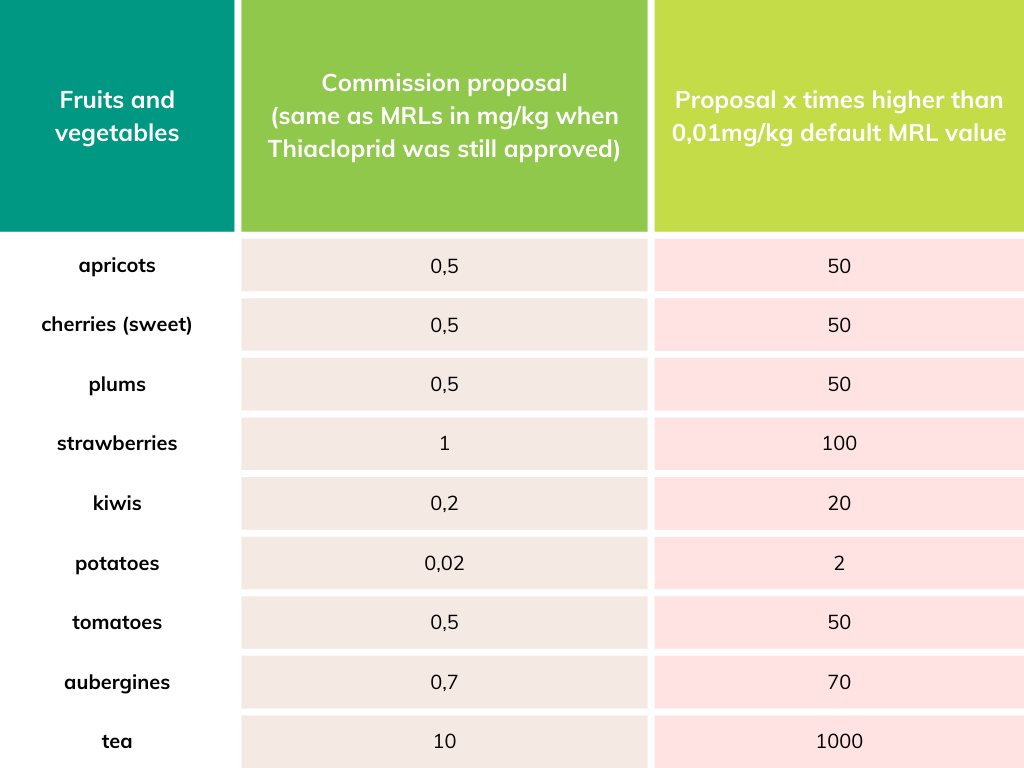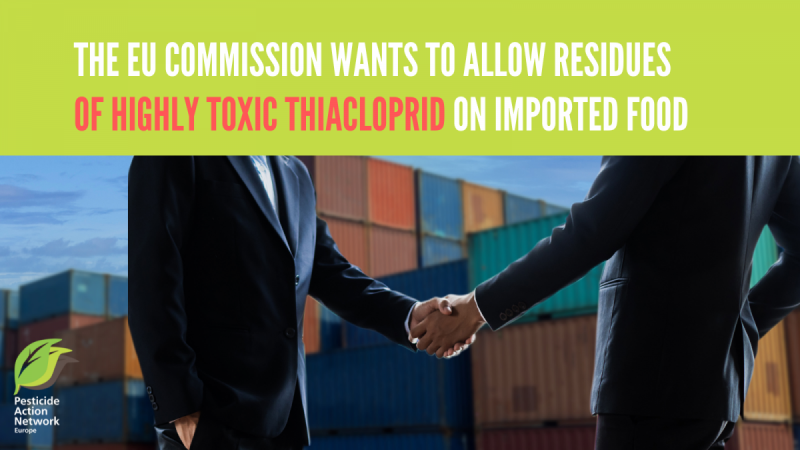The European Commission wants to allow residues of reprotoxic Thiacloprid on imported food. This is not in line with EU law, is bad for health and the environment and puts EU farmers in unfair competition with those in exporting countries. The ENVI committee in the European Parliament voted on January 11th to block this deviation from the EU rules. The plenary vote is this Wednesday. The support of a majority of the European Parliament for the position of its ENVI Committee is crucial to block the European Commission proposal.
- The proposal is not safe for European consumers and contradicts European regulation on pesticides.
- It establishes a double standard between EU farmers and thiacloprid importers.
- It allows trade partners to profit from exposing the environment and agricultural workers outside the EU to a particularly toxic substance.
Background
Thiacloprid was finally banned in the EU in 2020 due to its “cut off” classification as presumed to damage fertility and the unborn child (toxic for reproduction category 1B - R1B). This was five years late after its classification in 2015. Additionally, it was banned because of the carcinogenic potential of some of its metabolites, which contaminate drinking water above the parametric limit of 0.1 µg/L. The substance also raises other concerns, such as its high toxicity to bees as a neonicotinoid and to aquatic organisms. It was also classified as a suspected carcinogen (category 2) in 2015.
The ban of Thiacloprid occurred with years of delay but constituted an important step to protect citizens’ health. However, with this proposal to continue to allow high residues in imported food, thiacloprid would remain on citizens’ plates. It would pose a risk for pregnant women and the unborn and this is not legal.
The Pesticide Law says that exposure via food to a substance classified as toxic to reproduction and banned in the EU on that ground, shall not exceed 0.01 mg/kg for all food products regardless of their origin (Regulation 1107/2009, Annex II, point 3.6.4). The Commission is instead proposing to maintain the MRLs: for tea 1000 times higher than 0.01mg/kg, 100 times higher for red fruits, 70 times higher for aubergines and 50 times higher for tomatoes, apricots, peaches and plums. This process is using the 'import tolerance' possibility to allow producers, traders or retailers importing food with higher residue levels than foreseen in EU rules.

Double standards unfair for EU farmers
The proposal goes not only against the pesticides regulation. It also contradicts the commitment in the EU Farm to Fork Strategy to review import tolerances (...) and end double standards. The proposal is putting EU farmers in an unfair situation where they are no longer allowed to use the product because it is very toxic to health and the environment, but food grown with this harmful pesticide will still enter the EU market. So why should we allow imports with high toxic residues from other countries?
PAN Europe further considers it immoral to foster the use of a reprotoxic pesticide in third countries, that is also renowned for its toxicity to pollinators. Promoting its use will in addition induce contamination of groundwater in third countries with thiacloprid's carcinogenic metabolites.
Procedure for the proposal
The European Commission's proposal did not secure the support of a qualified majority of Member States last year, as several considered it contradictory to EU law. But now the Commission attempts to push it through. If the European Council or the European Parliament do not oppose this soon, the proposal will be adopted. If one of them opposes, the proposal will be vetoed and the Commission will have to lower the residue levels.
Remarkable: MEP Norbert Lins of the EPP Group in the European Parliament often claims to defend farmers but voted against the interests of farmers in the ENVI Committee.
PAN Europe acknowledges the efforts from MEPs Maria Arena, Michal Wiezik, Jutta Paulus and Anja Hazekamp who raised the issue to protect farmers, health and the environment.
